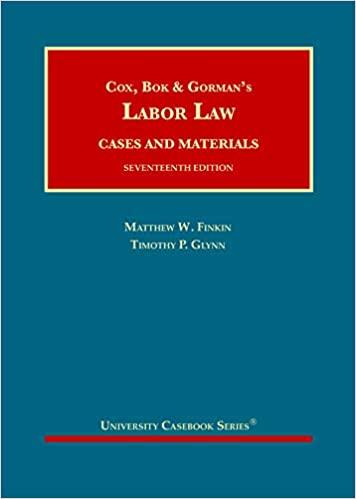Question
On the morning of September 11, 1975, an OSHA inspector entered the customer service area of Barlow's, Inc., an electrical and plumbing installation business located
On the morning of September 11, 1975, an OSHA inspector entered the customer service area of Barlow's, Inc., an electrical and plumbing installation business located in Pocatello, Idaho. The president and general manager, Ferrol G. "Bill" Barlow, was on hand; and the OSHA inspector, after showing his credentials, informed Mr. Barlow that he wished to conduct a search of the working areas of the business. Mr. Barlow inquired whether any complaint had been received about his company. The inspector answered no, but that Barlow's, Inc., had simply turned up in the agency's selection process. The inspector again asked to enter the nonpublic area of the business; Mr. Barlow's response was to inquire whether the inspector had a search warrant.
The inspector had none. Thereupon, Mr. Barlow refused the inspector admission to the employee area of his business. He said he was relying on his rights as guaranteed by the Fourth Amendment of the United States Constitution.
Three months later, the Secretary petitioned the United States District Court for the District of Idaho to issue an order compelling Mr. Barlow to admit the inspector. The requested order was issued on December 3D, 1975, and was presented to Mr. Barlow on January 5, 1976. Mr. Barlow again refused admission, and he sought his own injunctive relief against the warrantless searches assertedly permitted by OSHA. The Warrant Clause of the Fourth Amendment protects commercial buildings as well as private homes. To hold otherwise would belie the origin of that Amendment, and the American colonial experience.
The District Court ruled in the appellee's favor.
The Supreme Court affirmed the District Court's judgment.
Case Questions
Question 1. State, as briefly and clearly as possible, the argument that Barlow's is making in this case.
Question 2. Why would some industries or businesses be "closely regulated"? What are some of those businesses?
Question 3. The Fourth Amendment speaks of "people" being secure in their "persons, houses, papers, and effects." Why would the Fourth Amendment apply to a business, which is not in a "house"?
Student Feedback Question. How was your experience reviewing and responding to the case? Were the resources helpful?
Step by Step Solution
There are 3 Steps involved in it
Step: 1

Get Instant Access to Expert-Tailored Solutions
See step-by-step solutions with expert insights and AI powered tools for academic success
Step: 2

Step: 3

Ace Your Homework with AI
Get the answers you need in no time with our AI-driven, step-by-step assistance
Get Started


